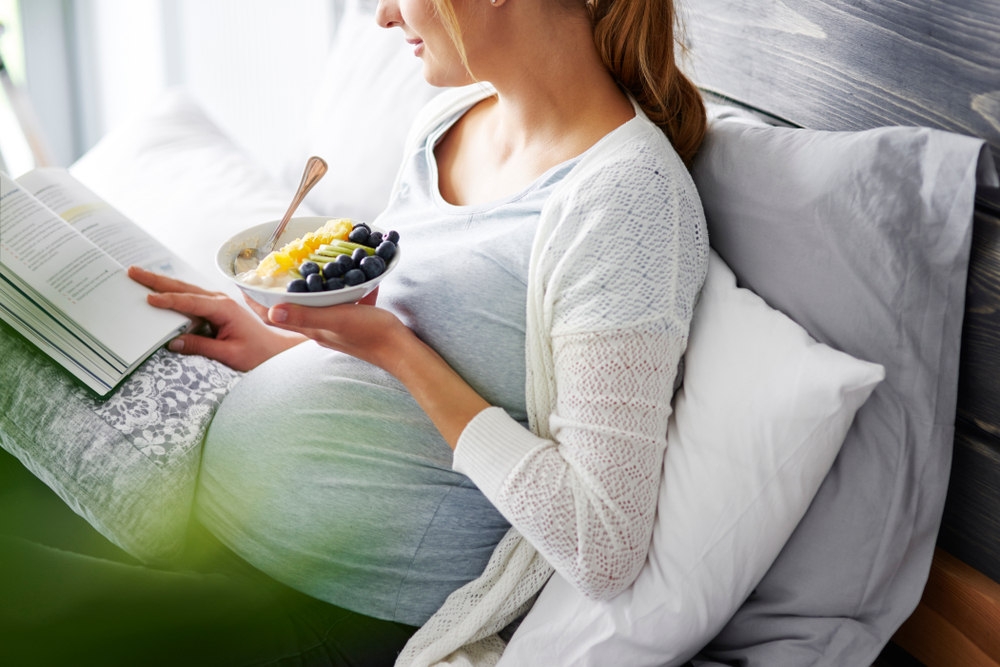
It’s always the go-to sign to show a woman is pregnant in movies. She’s sick, can’t stop throwing up, and wonders why she feels this way when she didn’t even drink the night before. Then it hits her — it’s morning sickness, and she’s pregnant.
While not every woman experiences morning sickness in real life (don’t brag if you didn’t), if you’re thinking about getting pregnant, want to be pregnant, or could potentially be pregnant right now, it’s a part you want to know about. You especially want to know: When does morning sickness start? Is it constant? How bad does it get? Not every part about being pregnant is rainbows and butterflies, so here’s some help about the part of growing a baby that makes you sick to your stomach.

Morning sickness strikes
When it starts during pregnancy
The reason shows and movies use morning sickness as a pregnancy clue is that, yes, it does hit you at the beginning. The majority of pregnant women (around 70%) feel queasy starting around the sixth week of growing that baby bean. While morning sickness starts early on, it could potentially last all the way through the fourth month. That is a lot of time feeling like you want to throw up, but worth it when you look into those gorgeous eyes you birthed.
When it hits you during the day
It may be called morning sickness, but that doesn’t mean it only gets you in the morning. You could be halfway through your day and think, yes, OK, we got through things, only to smell something in the afternoon or evening that sends you to the toilet.
When it’s the worst
You may start to get that sick feeling between weeks 6 and 8, but it will be the worst between weeks 8 and 10. The upswing in feeling sick during those weeks is because your body starts producing the hormone human chorionic gonadotropin (hCG) that tells the body to stop menstruating and to start thickening the uterine lining. A woman’s hCG levels are at their highest those weeks, and that’s when a handy, dandy bucket might be a pregnant woman’s best friend.

Morning sickness myths
There are some myths you may have heard about morning sickness, so let’s clear the air.
Myth #1 – Every woman experiences morning sickness
No, this isn’t true. Some women are the blessed, and those chosen ones and don’t have to worry about turning every bin into a puke bucket.
Myth #2 – Morning sickness will hit you only in the morning
As mentioned earlier, morning sickness could happen morning, noon, and night. You have that to look forward to.
Myth #3 – Don’t eat in the morning
This is the worst advice. Opting for smaller, lighter meals is the way to go, but don’t skip meals while pregnant.
Myth #4 – Puking or feeling queasy are the only morning sickness symptoms
There’s more. Feeling light-headed, dizzy, finding your mouth over-producing saliva, or suddenly having motion sickness are all other ways pregnant women experience morning sickness. It’s the gift that keeps on giving.

How to get through morning sickness until it ends
For most women, the ickiness ends between weeks 10 and 14, with some having to chew back the feeling up to weeks 16 through 20. The main thing you need to focus on if you experience morning sickness is how to stop yourself from getting triggered.
Know your smell and taste limits
It’s all about the scent the second it hits your nose. Not only do pregnant women have the sense of smell that would put a bloodhound to shame, but there is no rhyme or reason to what will send them running to the bathroom. Here are some tips:
- Scale it back to basic foods without heavy scents or aromas.
- Break meals up into smaller portions more often throughout the day.
- Pretend you’re having a sick day like when you were a kid — saltines and ginger ale, all the way.
- We know it’s hard to drink the recommended amount of water normally, but sip water all day long.
- Stay as cool as possible. Becoming overheated could trigger morning sickness.
- For some, the only way to keep the ick down is constantly popping sugar-free candies.
Get your rest
Seriously, get some rest. You won’t get any that first year, so sleep whenever you can. Rest, put your feet up, take a nap, and relax as much as possible to calm your body down and keep the morning sickness at bay.
If you don’t think your morning sickness is normal, it may not be
If you make it to around week 14 without morning sickness and then suddenly find yourself living in the bathroom, it could be fine, but you should talk with your doctor about it.
If you think your symptoms are way too intense, you could be among the extra-lucky 3% who have hyperemesis gravidarum. That is the condition where a pregnant person has excessive vomiting that causes weight loss and dehydration, which isn’t great normally, but less so when you are trying to grow a human. Make an appointment for your doctor to confirm the condition.
Pregnant women shouldn’t only wonder when morning sickness starts, specifically. Every woman is different, and oh boy, every pregnancy is different, so a good, well-rounded knowledge about morning sickness is needed. Morning sickness isn’t fun or glamorous, and finding a classy place to let it all out while running errands is a skill pregnant women will acquire. But at least you’ll know when it will get you and how to do your best to keep things settled. Let your pregnant glow shine — whether from the water weight or the morning sickness.



